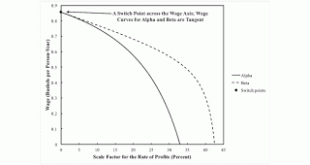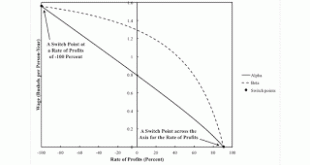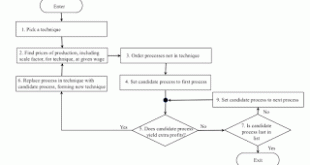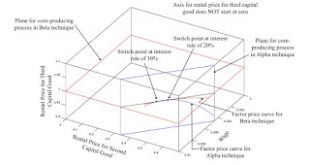1.0 Introduction I have not posted about a non-fluke switch point in a while. This is an example from Bertram Schefold. I have examined perturbations and variations of this example before. Here I present an example with tables exhibiting arithmetic. Is this any more transparent than examples presented with graphs? I have been listening to some lectures on YouTube, especially Richard Wolff. I now have another hypothesis why mainstream economists have been promoting lies, ignorance, and...
Read More »Old Findings For New Times
From John Kenneth Galbraith's The Affluent Society (1958), I know that widespread attitude to waged work among some in the United States is outdated. The conventional wisdom is that work is necessary because it is needed to produce the goods that sustain society. That was largely true before productivity increased so much, for example, in the post war golden age. Some jobs are still essential, by any narrow definition, but much wage work goes to creating goods and services that in any...
Read More »A Fluke Switch Point On The Wage Frontier
Figure 1: A Switch Point On The Wage Frontier with Wage Curves Tangent This post extends the example in my article in Structural Change and Economic Dynamics, suitably emended. Figure 2 shows an enlargement of part of the parameter space. The parameters of the point where the boundaries of Regions 1, 2, and 3 intersect are shown. In Region 1, the Beta technique is uniquely cost-minimizing for all feasible wages; there are no switch points. Region 2 is a reswitching example, with Beta...
Read More »A Fluke Case With Two Fluke Switch Points
Figure 1: Switch Points On The Axis For The Rate Of Profits And At r = -100 Percent This is an example of a fluke case in the analysis of the choice of technique. The interest in flukes, for me, is that they show how the characteristics of markets can change. They provide insight into structural economic dynamics, as Luigi Pasinetti calls it. I have previously shown a fluke case, with a switch point on the axis for the rate of profits with a real Wicksell effect of zero. A perturbation...
Read More »A Market Algorithm
Figure 1: Specification of a Market Algorithm1.0 Introduction This article is heavily based on Bidard (2004). An approach to the analysis of the choice of technique, in keeping with construction of the outer envelope of wage curves, is to consider replacing processes, more or less, one at a time. This post presents this approach as following an algorithm. Assume that a set of techniques exist where all techniques are at least viable, indecomposable, and produce the same set of...
Read More »Another Example Of The Factor Price Frontier In The Space Of Rental Prices
Figure 1: Real Factor Price Frontier1.0 Introduction I am planning on posting at an even slower rate for a while. This post continues my exploration of a way of visualizing the choice of technique proposed by Carlo Milana. In this post, I show how to correctly apply his visualization to an example from my 2017 ROPE paper. 2.0 Technology Two techniques are available for producing corn, the consumption good. Each technique consists of a flow-input, point-output technology, with a finite...
Read More »On “Democratic Socialism”
1.0 Introduction This post is about some usages of the phrase "democratic socialism". 2.0 Democratic Socialists of America (DSA) In the context of current American politics, I think the most salient usage today of this phrase is associated with Bernie Sanders' campaign and with the Democratic Socialists of America. DSA was founded in 1982 when the Democratic Socialist Organizing Committee (DSOC) merged with the New American Movement (NAM). The DSOC was established with Michael...
Read More »Two Propositions: Neoclassical Economics Is Incoherent; A Classical Theory Of Value Exists
[embedded content]Some Mathematics Useful In Understanding Classical Political Economy I consider the following to have been well established about half a century ago: Marginalism or so-called neoclassical economics is impossible to formulate consistently and with practical applications. A mathematically rigorous approach to the classical theory of value, from William Petty through David Ricardo, including Karl Marx, exists. Mainstream economists ignore the truth of both propositions....
Read More »Update To Example In Vienneau (2019)
Maybe this post should be titled "Erratum" or "corrigendum". I have an example in my paper last year in which wage frontiers are supposed to vary with two parameters. One is the markup in the "iron" industry. And the other is σ t. The example should be as in Table 1. All the theory and the visualizations in the paper work out with this example. Table 1: Technology for Producing Steel and Corn InputIndustryIronCornAlphaBetaLabora0,1 = 1aα,0,2(t) = (5191/5770) e(1/10) - σ taβ,0,2 =...
Read More »Elsewhere
John Weeks presents Joan Robinson's contributions to the Cambridge Capital Controversy (CCC). A discussion, from 2006, on Daily Kos, about one of my attempts to explain the CCC. A post, from 2016, on Naked Capitalism about how the CCC shows microeconomics is all wet. J. W. Mason has a handout explaining a definition of capital. Doyne Farmer, Fotini Markopoulou, Eric Beinhocker, and Steen Rasmussen, in an essay in Aeon, Collaborators in creation, provide an overview of complexity economics....
Read More » Heterodox
Heterodox




